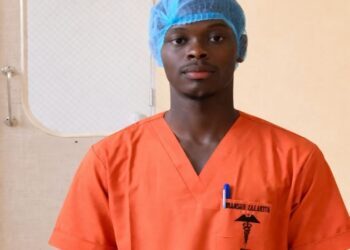By Sunday Isuwa, Abuja
Leading experts in the field of vascular surgery and diabetic foot care came together in United Kingdom for the International Conference on Limb Salvage and Amputation Prevention.
The conference, brought together renowned physicians and researchers to discuss the latest advancements in limb salvage techniques and strategies to prevent amputations in patients with diabetes mellitus.
Prominent figures such as Professor John C. Lantis, Professor Lantis II, MD, Professor Joseph L. Mills, and Professor Michael Edmonds were among the distinguished speakers at the conference.
These experts have made significant contributions to the field and have extensive experience in treating patients with vascular conditions and diabetic foot complications.
Professor John C. Lantis, a Professor of Medicine at the University of Colorado School of Medicine, delivered a keynote address highlighting the importance of interdisciplinary collaboration in limb salvage.
“In order to achieve successful outcomes in limb salvage, it is crucial for healthcare professionals from various specialties to work together,” said Professor Lantis.
“By combining our expertise, we can provide comprehensive care and improve patient outcomes.”
Professor Lantis II, MD, who serves as the site Chief and Professor of Surgery at Mount Sinai West Hospital and the Icahn School of Medicine, shared insights on his pioneering work in limb salvage and lower extremity wound healing.
With over 70 clinical trials under his belt, Professor Lantis II emphasized the need for evidence-based practices to guide treatment decisions.
“Through rigorous research and clinical trials, we can identify the most effective interventions for limb salvage and deliver personalized care to our patients,” he stated.
Dr. Joseph L. Mills, a board-certified vascular surgeon from Houston, Texas, focused his presentation on diabetic foot amputation prevention. With his extensive research background and involvement in over 40 clinical trials, Dr. Mills highlighted the importance of early diagnosis and intervention. “By implementing non-invasive diagnostic techniques and targeted interventions, we can significantly reduce the risk of amputation in patients with diabetes,” explained Dr. Mills.
Professor Michael Edmonds, a Consultant Physician at King’s College Hospital in London, shared his expertise in diabetic foot care. Recognized for his pioneering work in establishing a multidisciplinary diabetic foot clinic, Professor Edmonds stressed the significance of a comprehensive approach to patient care. “By bringing together specialists from various disciplines, we can address the complex needs of patients with diabetic foot complications and prevent unnecessary amputations,” said Professor Edmonds.
Professor Stephen Bain, the Clinical Director of the Diabetes Research Unit at Swansea University, discussed his role in leading several multi-center trials investigating novel therapies for diabetes. He emphasized the importance of research in advancing treatment options and improving patient outcomes. “Through clinical trials, we have the opportunity to discover new interventions that can transform the lives of individuals with diabetes,” stated Professor Bain.
The International Conference on Limb Salvage and Amputation Prevention provided a platform for these esteemed experts to share their knowledge and exchange ideas on the latest developments in the field.
The conference highlighted the importance of interdisciplinary collaboration, evidence-based practices, and research in advancing limb salvage techniques and preventing amputations in patients with diabetes mellitus.
As the conference concluded, attendees expressed their gratitude for the opportunity to learn from these renowned experts and their commitment to implementing the insights gained into their own clinical practice. The shared goal of all participants remains clear – to improve patient outcomes and enhance the quality of life for individuals facing the challenges of limb salvage and diabetic foot complications.











